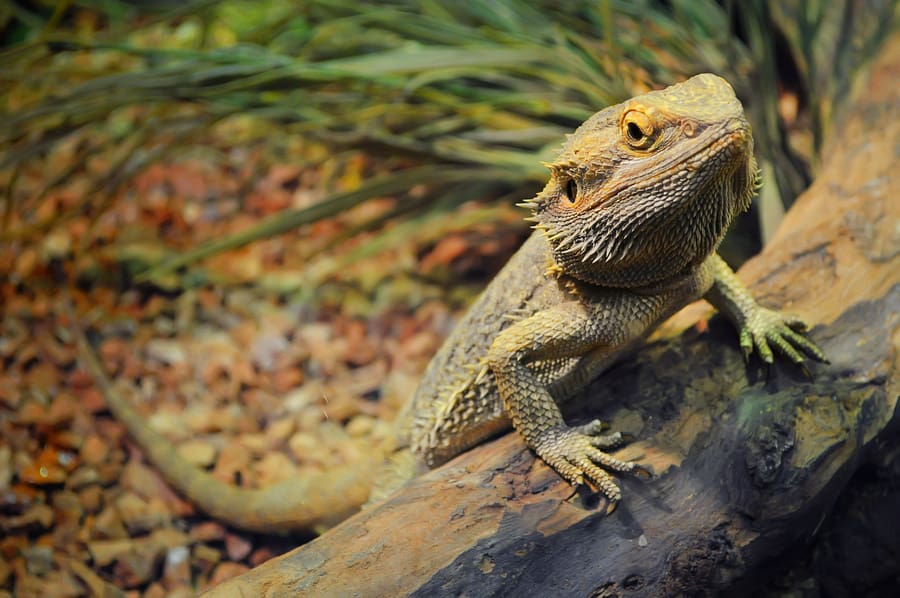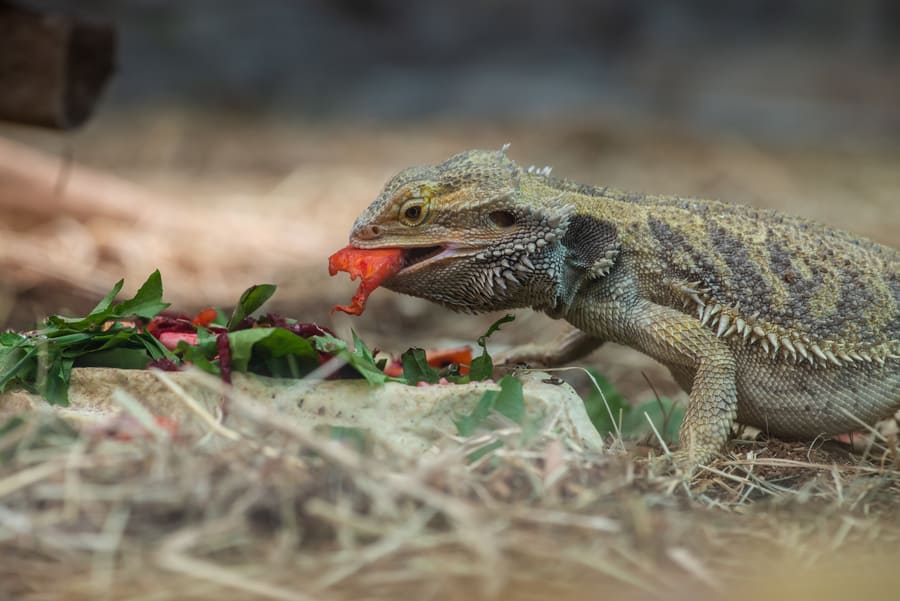
While many reptiles are less smelly than many mammal pets, they still can produce quite the odor. Many pet owners want to know if air fresheners or scented candles could be used to mask the odor. Even more importantly, are these odor eliminators or masking scents safe for reptiles?
Candles and any sort of air freshener are generally unhealthy for pet reptiles. While the issue mostly pertains to the fact that candles and air fresheners release chemicals and scents into the air, the particles that float in the air will settle on all surfaces. If the chemicals are eaten by a reptile, other problems could arise.
In this article, we will break down what you can do to keep a room smelling fresh while keeping your pet reptile safe. Lizards, turtles, and snakes can be very vulnerable to the chemicals in air fresheners and candles. Be sure to read this article in its entirety so you know what to do.
Candles & Air Fresheners: Pet Reptiles
When the candle or air freshener releases particles into the air, everything in the room—whether they are human, dog, cat, hamster, snake, or lizard—will inhale those particles. To some animals, this can be toxic, especially if the candle is made cheaply and releases zinc and other metals into the air.
Many reptile owners have reported hearing their leopard geckos and bearded dragons sneezing and wheezing before they figure out that the air freshener was the cause. In some more severe cases, it may lead to a respiratory infection (RI).
Additionally, the oils and particles in the air will eventually settle out onto all surfaces in the area, and that includes your reptile’s tank. Because many reptiles, including bearded dragons and leopard geckos, will stick their tongue out and lick nearly everything in their path, the reptile may ingest some substances that could make them sick. This can especially be a problem because the particles can land on the food that the reptile eats.
Yet, there does seem to be some disagreement in the reptile community about this being a problem for every reptile. Some reptile owners equate candles and air fresheners to the problems that eating chocolate can sometimes cause for dogs. While some reptiles may be sensitive to air fresheners, others may not show any signs of discomfort.
Regardless of whether reptile owners choose to risk candles, essential oil diffusers, and room fresheners, they should consider the potential consequences and figure out what is and is not generally safe for reptiles.
Are There Any Safe Varieties?
While some reptile owners claim that soy and wax candles are safe for reptiles, it is still not recommended to use any types of candles as air fresheners. Even if a candle produces natural particles, it can still cause problems for reptiles.
In fact, all candles produce soot in some shape or form. Soot is actually impure carbon particles that are produced when fuel is not completely combusted. While inefficient burning and wick candles do produce more soot than other types of candles, all candles produce soot even if they claim the opposite.
In addition, all candles will produce smoke. This smoke, or small particles that are visible when floating in the air, can also be harmful because the tiny particles can cross cell membranes and cause infection.
The scents found in candles and air fresheners are either considered to be natural and made from essential oils or artificial fragrance oils. Both essential oils and fragrance oils can cause problems. While many people think that essential oils are safe because they are natural products, they may still cause irritation and discomfort.
How to More Safely Have Candles & Reptiles in Room
If reptile owners do decide to use candles as a way to control odors, there are some precautions that they can take. Firstly, do not use them in the same room as the reptile if it can be helped. Instead, have the candle be in another room and use a fan to blow air out the window so that no residual particles can stay in the air.
Making sure the candle is in another room is especially important if the reptile owner lives in an apartment or poorly ventilated area because it is much harder to get good air circulation.
Another tip is to choose your candle wisely. For example, wicks that are too long will produce more smoke and soot. Additionally, candles that are made from Paraffin wax tend to produce more black smoke than candles made from vegetable waxes.
For the best candles that supposedly burn more cleanly, try using natural waxes such as soy, rapeseed, coconut, and beeswax. However, remember that these candles will still give off smoke and soot.
Are Air Fresheners & Febreze Safe for Reptiles?
Similar to candles, most air fresheners (including Febreze) contain tiny particles that when inhaled, can cause infections and discomfort. So while they may not be toxic to inhale, they could contribute to a respiratory infection.
Is Febreze Bad for Reptiles?
While Febreze may not necessarily be toxic for reptiles, some reptiles may be sensitive to odors. This may cause the reptile to sneeze and in more severe cases, it can cause a respiratory infection. Additionally, the amount of moisture in the air may also play a role in developing an infection.
In the reptile world, it is commonly known that too much moisture can lead to problems in reptiles that traditionally lived in dry conditions. So the combination of Febreze and too much moisture can cause an infection.
Is There a Way to Safely Use Air Fresheners?
Similar to candles, the safest way to use air fresheners is to open windows and make sure the air freshener is not sprayed in the same room as the reptiles. It is especially important to not spray the air freshener directly onto the reptile enclosure as that will irritate not only the reptile’s lungs but also the skin and eyes.
Safe Alternatives for Air Fresheners/Candles & Pet Reptiles
There are many natural ways to make a room smell better that do not use potentially harmful candles and air fresheners. If a reptile owner wants to make a room smell better, consider trying one or more of the following suggestions:
- Open windows to let fresh air inside.
- Use fans to circulate the air inside a house or apartment.
- Invest in some house plants (NASA’s clean air study recommends 2 or 3 for every 100 square feet of living space).
- Place orange, lemon, or lime peels in a pot with cinnamon sticks and let simmer in water (not boil).
- Place orange, lemon, or lime peels in a slow cooker with cinnamon sticks and water.
- Use vinegar diluted with water.
- Rosewater or any other water infused with herbs.
- Use baking soda, coffee grounds, charcoal, or zeolite to absorb odors. However, keep in mind that baking soda is toxic for reptiles if ingested. Keep all odor absorbers away from the tank.

Are there Approved Deodorizers Safe for Lizards?
While there may not necessarily be sprays that are safe to use in reptile enclosures, there are some products that have been shown to remove odors from reptile tanks. Mostly, these products will be used to clean the tank and help improve the smells.
Fluker’s Super Scrub Reptile Cleaner
Fluker’s Super Scrub Reptile Cleaner is specifically designed to clean a reptile enclosure. The natural enzymes are meant to act as natural deodorizers that keep the tank, decorations, and bowls smelling better longer. Additionally, the anti-bacterial properties help prevent harmful bacteria from growing in the tank.
Many customer reviews do rave about this product and how well it works to clean their reptile tanks. And, the brush attachment at the top makes it really easy to use. Click here to check out this product on Amazon and read some customer reviews.
Zoo Med Wipe Out Terrarium & Small Animal Cage Cleaner
Zoo Med Wipe Out Terrarium cleaner is a great product to use as a disinfectant and deodorizer. If used once a week, this product is almost guaranteed to help handle any tank odors. Additionally, the cleaner is odorless so that no reptile will be bothered by cleaning smells.
It also has been shown to keep bacteria at bay and kill salmonella, cholestasis, and pseudomonas instantly. However, make sure the tank is completely dry before returning the reptile to its tank. Click here to check out this product on Amazon and read some customer reviews.
No Scent Pet Odor Management
No Scent does offer a deodorizing spray that is safe for reptiles. Made with natural probiotics and sustainable chemicals, No Scent is a great product for eliminating odors. The enzymes used to make this product are meant to be long-lasting and are specifically designed to target reptile odors.
Many users have positive reviews about how well this product works to eliminate smells. However, the best results came from the combination of a clean tank and using this deodorizing spray.
How to Keep Reptile Enclosure from Stinking
If a reptile cage is thoroughly cleaned on a regular schedule, reptile owners should not experience any problems with odors. But, there are still plenty of easy ways to keep a reptile tank from smelling. However, the first step to taking care of nasty odors is to figure out if it is your reptile’s tank that smells or the reptile itself.
How to Tell if Your Reptile Smells
Typically, a reptile will smell because of either the substrate that is being used in the enclosure or because there is some sort of fungal infection. Also, a tank that is not cleaned regularly may also make the reptile stink because there is more fecal matter to walk around in.
If the substrate is the issue, it’s most likely because the tank has a loose substrate. The loose substrate generally traps more odors from urine and poo, so it can start to smell bad rather quickly.
Even if the urine and poo are scooped up instantly, it’s still nearly impossible to get every grain of sand or every piece of newspaper that came in contact with the excrement. When smelly substances are hanging around in the tank, the reptile will be more likely to step into the stinky area. Thus, the reptile starts to stink. To avoid this smelly problem, make the switch to tile or reptile carpet.
If a fungal infection is the cause of the stink, there will be other health issues associated as well. If there is no noticeable difference to the reptile’s skin, try tips in the following section to get rid of the smell. If after all steps to remove the smell have been taken and there is still a persistent odor, contact the vet to determine the next steps.
How to Make a Reptile Less Smelly
The best ways to get rid of stinky reptile smells are to clean the enclosure and then give the reptile a luke-warm bath. The bath does not have to be long, but gently rubbing the reptile’s skin and letting it soak in the bath should help get rid of any residual smells.
If the reptile allows it, try using a soft toothbrush to gently rub the reptile’s skin. Don’t rub too hard, however, because that may irritate its skin.
How to Tell if the Reptile Enclosure Smells
If the reptile has had a bath and no longer smells, then odds are the enclosure is the stinky culprit. As mentioned above, loose substrate is one of the main causes of a smelly tank, but rotting food and hidden poos may also be contributing to the unpleasant scent of the enclosure.
To see if the enclosure is the cause of any smells, simply take a good whiff of the tank. If it smells, it’s time to clean.
How to Make a Reptile Enclosure Less Smelly
Ideally, the tank will be deep cleaned every other week or so. However, all leftover food and any feces should be cleaned out daily to avoid any smells. In fact, one of the most common (and worst) smells is the scent of a cricket that crawled under a decoration and died. So by moving the pieces of décor around and looking for dead critters, the likelihood of bad smells has already been lessened.
The best way to keep a tank from smelling is to form good habits and follow the following steps:
- Pick up all leftover food within 24 hours.
- Replace the reptile’s water every day.
- Clean feces and urine every day.
- Clean the tank and decorations every other week.
- If loose substrate is used, replace it often. Newspaper should be replaced weekly. Sand should be completely replaced every 3 to 4 months.
- If using reptile carpet or tile, wipe off the bottom of the tank to remove any urine or feces.
- Use an approved reptile deodorizer (find the list of the most popular ones above).
- Give the reptile a bath when needed.
